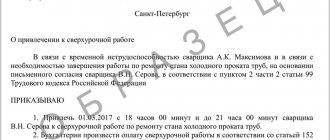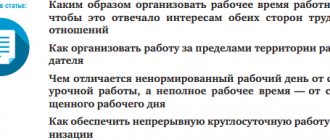Is a methodological day a day off?
No, since such days are provided for a specific “working” purpose. Even if the teacher is away from the organization on this day, it cannot be considered a day off with all the ensuing consequences, and is also not subject to double payment if the employer calls the employee to work on this day.
If the methodological day is not established by local acts of the institution, but according to schedules and schedules the teacher has the whole day free, he can be involved in educational, methodological or organizational work within the normalized part of working time.
Article 331. The right to engage in teaching activities
Persons who have an educational qualification are allowed to engage in teaching activities, which is determined in the manner established by the standard regulations on educational institutions of the relevant types and types, approved by the Government of the Russian Federation.
The following persons are not allowed to engage in teaching activities:
deprived of the right to engage in teaching activities in accordance with a court verdict that has entered into legal force;
have or have had a criminal record, are or have been subject to criminal prosecution (except for persons against whom criminal prosecution was terminated on rehabilitative grounds) for crimes against life and health, freedom, honor and dignity of the individual (with the exception of illegal placement in a psychiatric hospital, slander and insult ), sexual integrity and sexual freedom of the individual, against family and minors, public health and public morality, the foundations of the constitutional order and state security, as well as against public safety;
(as amended by Federal Law dated April 1, 2012 N 27-FZ)
having an unexpunged or outstanding conviction for intentional grave and especially grave crimes;
recognized as legally incompetent in accordance with the procedure established by federal law;
having diseases included in the list approved by the federal executive body exercising the functions of developing state policy and legal regulation in the field of healthcare.
(Part two as amended by Federal Law dated December 23, 2010 N 387-FZ)
What documents regulate the process of organizing a daily routine and rest?
These include:
- schedule for providing additional days of rest;
- application for the establishment (cancellation) of part-time work;
- vacation schedule;
- application for leave;
- order(s) on granting leave to the employee(s);
- note-calculation on granting leave to the employee;
- timesheets for recording working hours and calculating wages;
- order (instruction) to send an employee on a business trip.
What about in practice?
In practice, the procedure for performing job duties outside the normal academic workload, that is, the non-standard part of the work, is not always clearly stated in local acts, schedules or plans. Therefore, disputes often arise between employees and the employer regarding payment for time worked: employees believe that they work more than they are entitled to.
Today, only cases of overwork or imperfection of a standardized part of the work are regulated by law. For example, for pedagogical or educational work performed by a teacher with his written consent above or below the established norm of hours for the wage rate, payment is made in proportion to the actually determined volume of pedagogical or educational work (clause 4 of Appendix 1 to Order No. 1601).
Thus, until changes or additions are made to the regulations governing the recording of teachers’ working time in terms of non-standardized teaching work, questions will arise.
The employer needs to minimize such overtime, taking into account working hours, distributing the regulated part so that employees have free days during the holidays. even more materials, as well as samples of necessary documents for both schools and preschool educational institutions , in our “Directory” system. Here you can see your colleagues’ questions with the lawyer’s answers, as well as ask questions that interest you in a special form.
Normal working hours for teaching staff
Until recently, the procedure for calculating the normal working hours of teaching staff remained unclear. The order issued by the Ministry of Education and Science of the Russian Federation (which will replace the current Decree of the Government of the Russian Federation dated April 3, 2003 No. 191) eliminates this gap, since it establishes a clear relationship between the normal working hours and the characteristics of its implementation by teaching staff.
Let us remind you that in accordance with Art. 333 of the Labor Code of the Russian Federation for teaching staff, a reduced working time (compared to that provided for in Article 91 of the Labor Code of the Russian Federation) is established - no more than 36 hours per week.
The authority to determine the duration of working hours (standard hours of teaching work per wage rate) depending on the position and (or) specialty of a teaching worker (taking into account the characteristics of his work) is within the competence of the Ministry of Education of Russia.
According to the order of the Ministry of Education and Science of Russia dated December 24, 2010 No. 2075 “On the duration of working hours (standard hours of teaching work for the wage rate) of teaching workers,” the normal duration of working hours has been clarified in relation to the corresponding categories of teaching workers.
The working hours of teaching staff include:
• teaching (educational) work;
• educational work;
• other pedagogical work provided for by the qualification characteristics for positions and the characteristics of the working hours and rest periods of teaching (other) employees of educational institutions, approved in the prescribed manner.
For teachers, instructors, additional education teachers, senior additional education teachers, trainers-teachers, senior trainers-teachers, the standard hours of teaching work per wage rate includes the lessons (classes) they conduct, regardless of their duration, and short breaks (recesses) between them.
WORKING TIME
The working hours of 36 hours per week are determined by:
1) employees from among the teaching staff of educational institutions of higher professional education and educational institutions of additional professional education (advanced training) specialists;
2) senior educators of preschool educational institutions, educational institutions of additional education for children and children's homes;
3) educational psychologists, social educators, teacher-organizers, industrial training masters, senior counselors, as well as labor instructors;
4) methodologists and senior methodologists of educational institutions;
5) tutors of educational institutions (with the exception of tutors engaged in the field of higher and additional professional education);
6) heads of physical education of educational institutions implementing educational programs of primary vocational and secondary vocational education;
7) teachers-organizers of the basics of life safety (pre-conscription training);
 instructors-methodologists and senior instructors-methodologists of educational institutions of additional education for children in sports.
instructors-methodologists and senior instructors-methodologists of educational institutions of additional education for children in sports.
Working hours of 30 hours per week are established for senior educators of educational institutions (with the exception of preschool educational institutions and educational institutions for additional education of children).
NORMALIZED PART OF WORK
The standard hours of teaching work per wage rate (the so-called standardized part of teaching work) can range from 18 to 36 hours per week (including the wage rate for the corresponding teaching position (category)). The standard hours may be limited to a maximum value per year.
The norm equal to 18 hours per week is established:
1) teachers of grades I–XI (XII) of educational institutions implementing general education programs (including special (correctional) educational programs for students and pupils with disabilities);
2) teachers of educational institutions implementing educational programs of secondary vocational education with a pedagogical orientation (with the exception of teachers of such educational institutions for which the norm of teaching hours is established at a salary rate of 720 hours per year);
3) teachers of special disciplines I–XI (XII) classes of music and art general educational institutions;
4) teachers of grades III–V of schools of general music, art, choreographic education with a five-year period of study, grades V–VII of art schools with a seven-year period of study (children’s music, art, choreography and other schools), grades I–IV of children’s art schools and schools of general art education with a four-year period of study;
5) teachers of additional education, senior teachers of additional education;
6) trainers-teachers, senior trainers-teachers;
7) teachers of educational institutions of additional education for children with a sports profile;
 foreign language teachers of preschool educational institutions;
foreign language teachers of preschool educational institutions;
9) speech therapists of health care and social service institutions.
The norm equal to 24 hours per week is established:
1) teachers of grades I–II of schools of general music, art, choreographic education with a five-year term of study, grades I–IV of children’s music, art, choreography schools and art schools with a seven-year term of study;
2) 720 hours per year - to teachers of educational institutions implementing educational programs of primary vocational and secondary vocational education.
STANDARD HOURS OF WORK FOR WAGE RATE
The standard hours of teaching work per wage rate are:
1) 20 hours per week - for speech pathologists, speech therapists and speech therapists;
2) 24 hours a week - for music directors and accompanists;
3) 25 hours a week - for educators working directly in groups with students (pupils, children) with disabilities;
4) 30 hours per week - for physical education instructors; educators in boarding schools, orphanages, after-school groups, boarding schools at general educational institutions (boarding schools), special educational institutions for children and adolescents with deviant (deviant) behavior, preschool educational institutions (groups) for children with tuberculosis intoxication, as well as in health and social care institutions;
5) 36 hours per week - for teachers in preschool educational institutions, preschool groups of general education institutions and educational institutions for children of preschool and primary school age, as well as in educational institutions for additional education of children, in dormitories of educational institutions implementing educational programs of primary vocational and secondary professional education, other institutions and organizations.
The standard hours of teaching and (or) teaching work for the salary rate of teaching staff is established in astronomical (not academic) hours.
DEVIATIONS FROM NORMAL WORKING HOURS
For teaching (pedagogical) work performed by a teaching employee (with his consent) in excess of the established standard hours for the wage rate , additional payment must be made in accordance with the received wage rate in a single amount.
In turn, teachers (teachers) who are not provided with the standard teaching load have the right to receive appropriate monetary compensation (additional payments).
Thus, teachers who, for one reason or another, cannot be provided with a teaching load in the amount corresponding to the standard hours of teaching work for the weekly wage rate, are guaranteed payment of the salary rate in full, provided that they are supplemented to the established standard hours with other teaching work in the following cases:
a) teachers of grades I–IV - when transferring the teaching of foreign language lessons, music, fine arts and physical education to specialist teachers;
b) teachers of grades I–IV of rural general education institutions with a native (non-Russian) language of instruction - if they do not have sufficient training to teach Russian language lessons;
c) Russian language teachers in rural primary secondary schools with native (non-Russian) language of instruction;
d) physical education teachers of rural general educational institutions, foreign language teachers of general educational institutions - if these institutions are located in the villages of logging (rafting) enterprises and chemical forestry enterprises.
REDUCE YOUR STUDY LOAD
Teachers and teachers of educational institutions implementing educational programs of secondary vocational education with a pedagogical orientation , for whom, for reasons beyond their control, during the academic year the teaching load is reduced (compared to the teaching load established at the beginning of the academic year) until the end of the academic year, as well as during vacations that do not coincide with the annual main extended paid leave (Article 334 of the Labor Code of the Russian Federation), the following is paid:
a) wages for the actual remaining number of hours of teaching work, if it exceeds the standard hours of teaching work per week established for the teacher (teacher) for the wage rate;
b) salary in the amount of a monthly rate, if the volume of the teaching load before it was reduced corresponded to the standard hours of teaching work per week established for the teacher (teacher) for the salary rate, and at the same time it is impossible to load him with other teaching work;
c) wages established before the teaching load was reduced, if it was set below the standard hours of teaching work per week established for the teacher (teacher) for the salary rate, and at the same time it is impossible to load him with other teaching work.
An exception is made for teachers of such educational institutions, for which the standard hours of teaching work are established at a salary rate of 720 hours per year.
The specified teaching staff must be notified of a reduction in the teaching load during the academic year and of additional teaching work no later than two months in .
Teachers of educational institutions implementing educational programs of primary (secondary) vocational education , for whom, for reasons beyond their control, during the academic year the teaching load is reduced (compared to the teaching load established at the beginning of the academic year) until the end of the academic year, as well as Vacation time that does not coincide with the annual main extended paid leave, wages are paid in the amount established during tariff calculation at the beginning of the academic year.









